Depression and Anxiety in Later Life
A Johns Hopkins Press Health Book

Depression and Anxiety in Later Life
What Everyone Needs to Know
Mark D. Miller, M.D.
and Charles F. Reynolds III, M.D.

Note to the reader: This book is not meant to substitute for medical care of people with depression or anxiety, and treatment should not be based solely on its contents. Instead, treatment must be developed in a dialogue between the individual and his or her physician. Our book has been written to help with that dialogue.
All efforts have been made to ensure the accuracy of the information contained in this book as of the date of publication. The authors and the publisher expressly disclaim responsibility for any adverse outcomes arising from the use or application of the information contained herein.
The authors and publisher have made reasonable efforts to determine that the selection and dosage of drugs, devices, and treatments discussed in this text conform to the practices of the general medical community. The drugs, devices, and treatments described do not necessarily have specific approval by the U.S. Food and Drug Administration for use as they are recommended. In view of ongoing research, changes in governmental regulations, and the constant flow of information relating to drug therapy and drug reactions, the reader is urged to check the package insert of each drug for any change in indications and dosage and for warnings and precautions. This is particularly important when the recommended agent is a new and/or an infrequently used drug.
2012 The Johns Hopkins University Press
All rights reserved. Published 2012
Printed in the United States of America on acid-free paper
9 8 7 6 5 4 3 2 1
The Johns Hopkins University Press
2715 North Charles Street
Baltimore, Maryland 21218-4363
www.press.jhu.edu
Library of Congress Cataloging-in-Publication Data
Miller, Mark D., 1955
Depression and anxiety in later life : what everyone needs to know / Mark D. Miller and Charles F. Reynolds III.
p. cm. (Johns Hopkins Press health book)
Includes bibliographical references and index.
ISBN 978-1-4214-0629-9 (hdbk. : alk. paper) ISBN 978-1-4214-0630-5 (pbk. : alk. paper) ISBN 978-1-4214-0707-4 (electronic) ISBN 1-4214-0629-2 (hdbk. : alk. paper) ISBN 1-4214-0630-6 (pbk. : alk. paper) ISBN 1-4214-0707-8 (electronic)
1. Depression in old agePopular works. 2. Older peopleMental healthPopular works. 3. Older peopleHealth and hygienePopular works. 4. AgingPopular works. I. Reynolds, Charles F., 1947 II. Title.
RC537.5.M5385 2012
618.9768527dc23 2012000021
A catalog record for this book is available from the British Library.
Special discounts are available for bulk purchases of this book. For more information, please contact Special Sales at 410-516-6936 or specialsales@press.jhu.edu.
The Johns Hopkins University Press uses environmentally friendly book materials, including recycled text paper that is composed of at least 30 percent post-consumer waste, whenever possible.
CONTENTS
PREFACE
Thanks to numerous medical advances, humans are living longer, on average, than at any previous time in history. The average lifespan for American men is 77 years, and for American women, 80 years. By living longer, we have opportunities that werent available to previous generations, but we also have a greater chance of accumulating chronic medical problems, experiencing various stresses that can lead to depression or anxiety, and developing memory impairment or dementia. Depression and anxiety disorders are two mental health issues that can burden up to half of older adults, some for the first time, others as a recurring challenge to their quality of life.
Contrary to the beliefs of many people, however, neither depression nor excessive anxiety is a normal part of aging. The risk factors for becoming depressed or excessively anxious are many and varied. They range from the grief of losing a loved one to the crushing disability of chronic pain to fears of running out of money.
Successful aging, on the other hand, requires that people adapt to the changing circumstances that accompany the process of getting older. People who can better control the risk factors stand a better chance of keeping depression and anxiety out of their lives as they age and, therefore, of enjoying the people and activities that bring them pleasure and fulfillment.
You may be reading this book as an older adult who senses or knows that something isnt quite right, as someone who has experienced depression or anxiety in the past and wants to make the most of an approaching retirement, or as the adult child of an older person. Our aim is to give you the latest knowledge about understanding depression and anxiety and their most common underlying risk factors for older adults.
We are two geriatric psychiatrists with over 50 years of combined experience treating older patients and conducting mental health research. This is our second book about mental health issues for older adults. We wrote our first, Living Longer Depression Free, about late-life depression and effective treatments. Since the release of that book in 2002, medical science has learned much more about risk factors for depression and for anxiety, which often occurs with depression.
This book provides information about recognizing, treating, and preventing these risks, which we frame around questions we frequently hear from our patients:
 Im getting forgetful. Do I have dementia?
Im getting forgetful. Do I have dementia?
 How do I cope with my chronic illness or disability?
How do I cope with my chronic illness or disability?
 What can be done about my chronic pain?
What can be done about my chronic pain?
 Why do I feel so tired?
Why do I feel so tired?
 How do I cope with the loss of my loved one?
How do I cope with the loss of my loved one?
 How can I stop or avoid overusing alcohol or prescription drugs?
How can I stop or avoid overusing alcohol or prescription drugs?
 How do I achieve healthy body weight and good nutrition?
How do I achieve healthy body weight and good nutrition?
 How can I preserve or reactivate my sex life?
How can I preserve or reactivate my sex life?
 How can I prepare for lifes final phase?
How can I prepare for lifes final phase?
 How do I make sense of my life and continue to lead a fulfilling life?
How do I make sense of my life and continue to lead a fulfilling life?
The struggle implied by each of these questions can lead a given person to feel anxious, demoralized, or depressed but also, we hope, motivated to learn more and take action.
In some instances, biological or chemical processes related to the factors alluded to in these questions can cause depression or anxiety. Conversely, having a rational discussion about each question and understanding treatment options can provide some relief and hope. Each of the chapters in part II of this book explores one of these questions to help you seek the best options for preventing or minimizing anxiety and depression as a result of that factor. Part I explains our current understanding of depression and anxiety and discusses the relationship between the two.
Next page

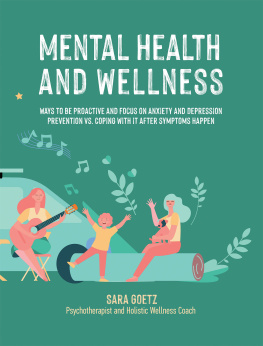

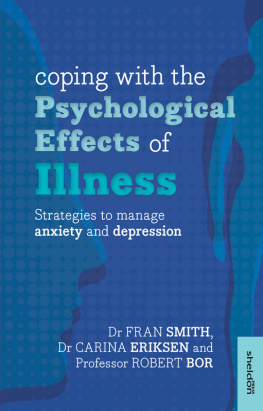
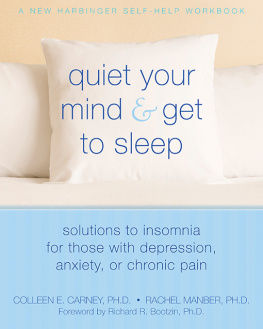
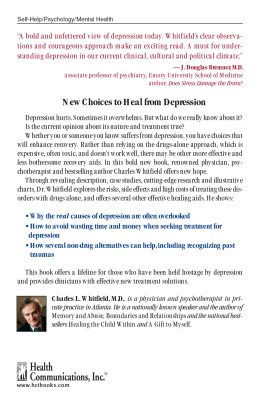
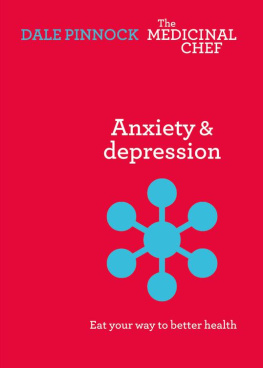
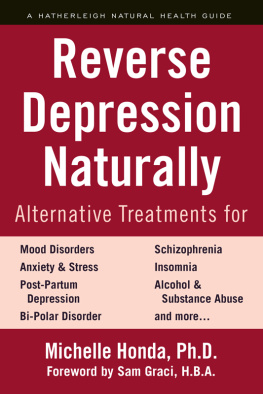
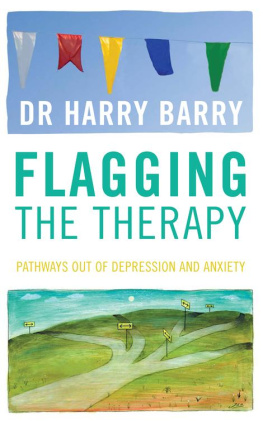
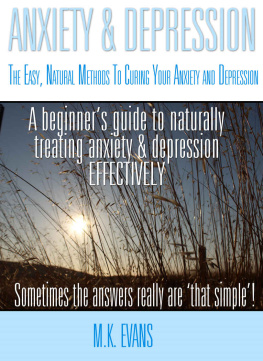
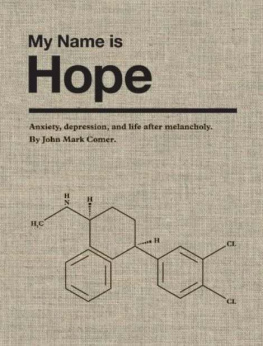


 Im getting forgetful. Do I have dementia?
Im getting forgetful. Do I have dementia?